Ethical Dimensions of Facebook Data Breach: A Comprehensive Analysis
VerifiedAdded on 2023/06/09
|7
|2725
|328
Essay
AI Summary
This essay provides an in-depth ethical analysis of the Facebook data breach incident involving Cambridge Analytica and the personal data of millions of Facebook users. It examines the issue from three distinct perspectives: professional ethics, philosophical ethics, and sociological ethics. The analysis explores the responsibilities of Facebook as a platform, the role of user awareness and behavior, and the broader societal implications of data misuse. The essay also discusses the lack of proper risk management and mitigation plans by Facebook, the ethical considerations of third-party vendors using breached data, and the importance of spreading awareness among users about data security and privacy. It concludes that the data breach raises significant ethical concerns related to privacy, security, and the responsible use of personal information in the digital age. Desklib offers a variety of resources for students, including solved assignments and past papers.
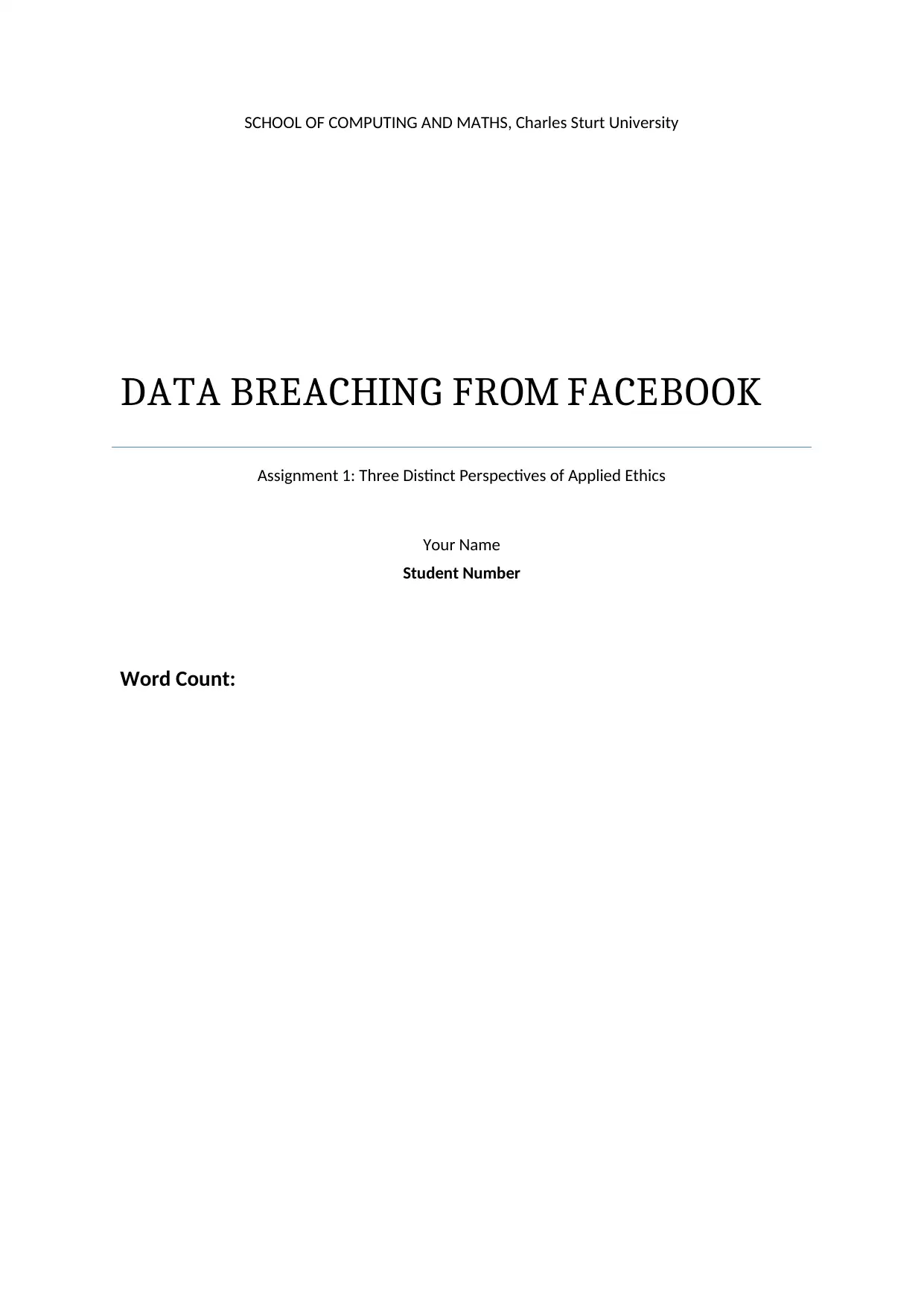
SCHOOL OF COMPUTING AND MATHS, Charles Sturt University
DATA BREACHING FROM FACEBOOK
Assignment 1: Three Distinct Perspectives of Applied Ethics
Your Name
Student Number
Word Count:
DATA BREACHING FROM FACEBOOK
Assignment 1: Three Distinct Perspectives of Applied Ethics
Your Name
Student Number
Word Count:
Paraphrase This Document
Need a fresh take? Get an instant paraphrase of this document with our AI Paraphraser
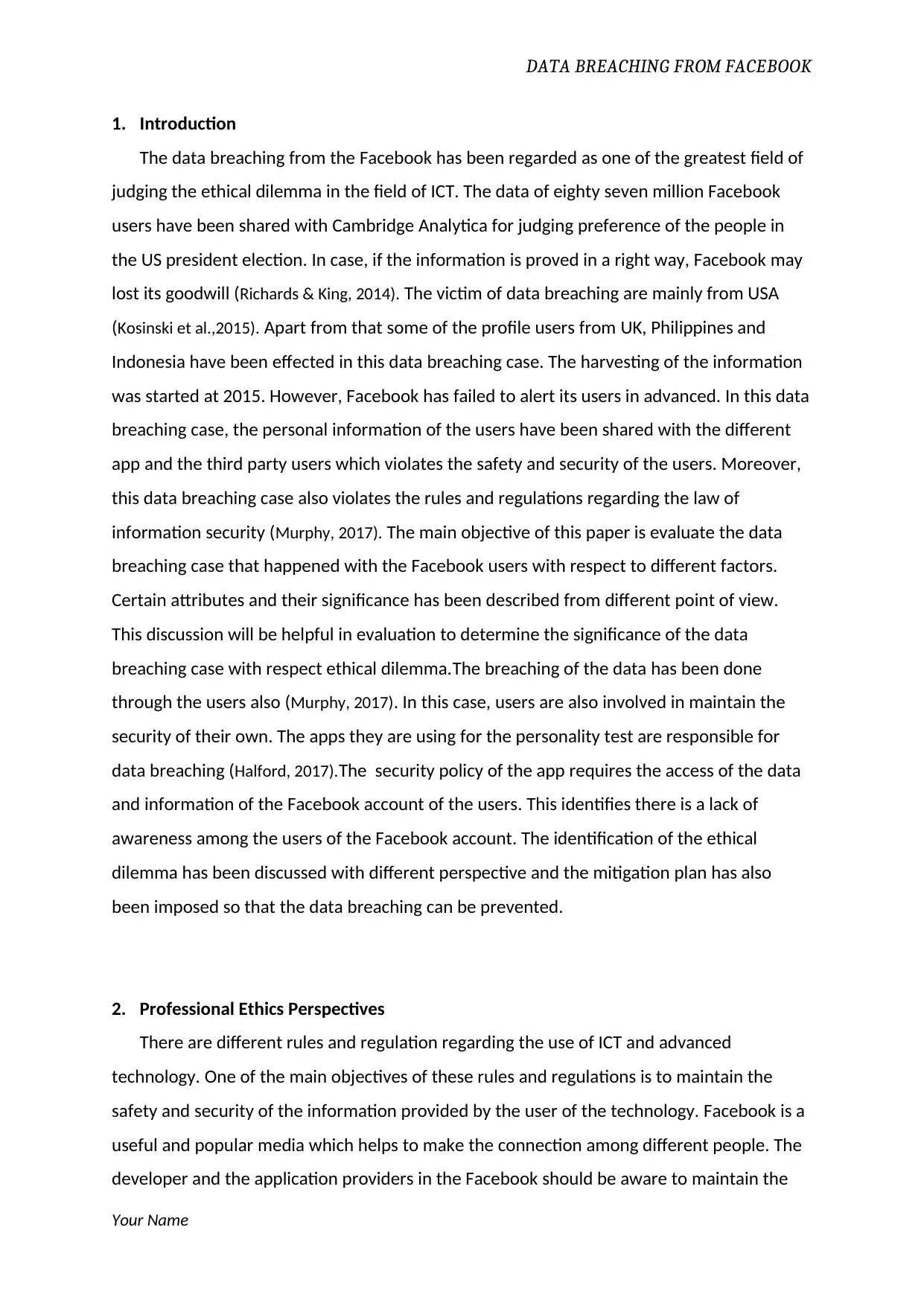
DATA BREACHING FROM FACEBOOK
1. Introduction
The data breaching from the Facebook has been regarded as one of the greatest field of
judging the ethical dilemma in the field of ICT. The data of eighty seven million Facebook
users have been shared with Cambridge Analytica for judging preference of the people in
the US president election. In case, if the information is proved in a right way, Facebook may
lost its goodwill (Richards & King, 2014). The victim of data breaching are mainly from USA
(Kosinski et al.,2015). Apart from that some of the profile users from UK, Philippines and
Indonesia have been effected in this data breaching case. The harvesting of the information
was started at 2015. However, Facebook has failed to alert its users in advanced. In this data
breaching case, the personal information of the users have been shared with the different
app and the third party users which violates the safety and security of the users. Moreover,
this data breaching case also violates the rules and regulations regarding the law of
information security (Murphy, 2017). The main objective of this paper is evaluate the data
breaching case that happened with the Facebook users with respect to different factors.
Certain attributes and their significance has been described from different point of view.
This discussion will be helpful in evaluation to determine the significance of the data
breaching case with respect ethical dilemma.The breaching of the data has been done
through the users also (Murphy, 2017). In this case, users are also involved in maintain the
security of their own. The apps they are using for the personality test are responsible for
data breaching (Halford, 2017).The security policy of the app requires the access of the data
and information of the Facebook account of the users. This identifies there is a lack of
awareness among the users of the Facebook account. The identification of the ethical
dilemma has been discussed with different perspective and the mitigation plan has also
been imposed so that the data breaching can be prevented.
2. Professional Ethics Perspectives
There are different rules and regulation regarding the use of ICT and advanced
technology. One of the main objectives of these rules and regulations is to maintain the
safety and security of the information provided by the user of the technology. Facebook is a
useful and popular media which helps to make the connection among different people. The
developer and the application providers in the Facebook should be aware to maintain the
Your Name
1. Introduction
The data breaching from the Facebook has been regarded as one of the greatest field of
judging the ethical dilemma in the field of ICT. The data of eighty seven million Facebook
users have been shared with Cambridge Analytica for judging preference of the people in
the US president election. In case, if the information is proved in a right way, Facebook may
lost its goodwill (Richards & King, 2014). The victim of data breaching are mainly from USA
(Kosinski et al.,2015). Apart from that some of the profile users from UK, Philippines and
Indonesia have been effected in this data breaching case. The harvesting of the information
was started at 2015. However, Facebook has failed to alert its users in advanced. In this data
breaching case, the personal information of the users have been shared with the different
app and the third party users which violates the safety and security of the users. Moreover,
this data breaching case also violates the rules and regulations regarding the law of
information security (Murphy, 2017). The main objective of this paper is evaluate the data
breaching case that happened with the Facebook users with respect to different factors.
Certain attributes and their significance has been described from different point of view.
This discussion will be helpful in evaluation to determine the significance of the data
breaching case with respect ethical dilemma.The breaching of the data has been done
through the users also (Murphy, 2017). In this case, users are also involved in maintain the
security of their own. The apps they are using for the personality test are responsible for
data breaching (Halford, 2017).The security policy of the app requires the access of the data
and information of the Facebook account of the users. This identifies there is a lack of
awareness among the users of the Facebook account. The identification of the ethical
dilemma has been discussed with different perspective and the mitigation plan has also
been imposed so that the data breaching can be prevented.
2. Professional Ethics Perspectives
There are different rules and regulation regarding the use of ICT and advanced
technology. One of the main objectives of these rules and regulations is to maintain the
safety and security of the information provided by the user of the technology. Facebook is a
useful and popular media which helps to make the connection among different people. The
developer and the application providers in the Facebook should be aware to maintain the
Your Name
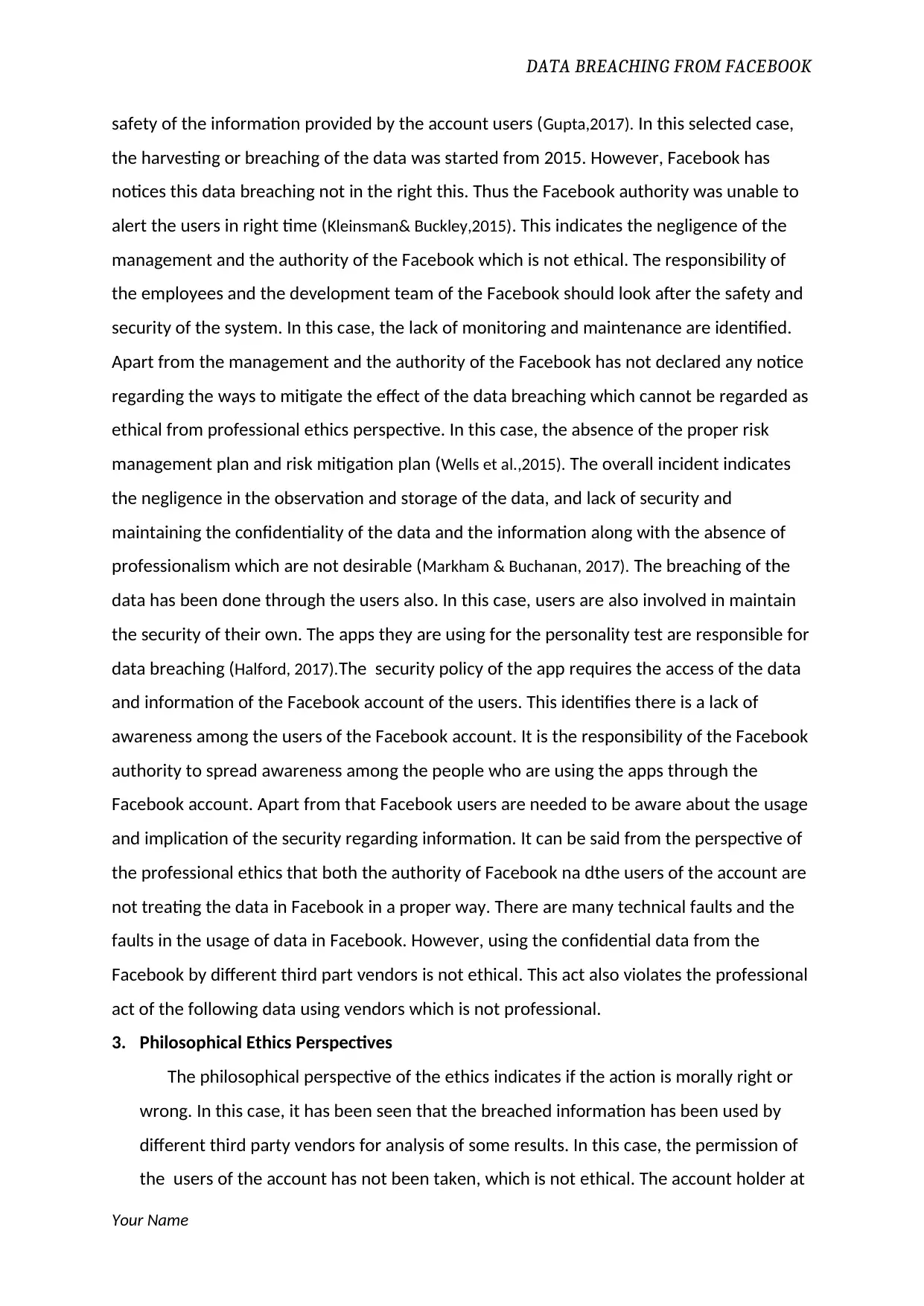
DATA BREACHING FROM FACEBOOK
safety of the information provided by the account users (Gupta,2017). In this selected case,
the harvesting or breaching of the data was started from 2015. However, Facebook has
notices this data breaching not in the right this. Thus the Facebook authority was unable to
alert the users in right time (Kleinsman& Buckley,2015). This indicates the negligence of the
management and the authority of the Facebook which is not ethical. The responsibility of
the employees and the development team of the Facebook should look after the safety and
security of the system. In this case, the lack of monitoring and maintenance are identified.
Apart from the management and the authority of the Facebook has not declared any notice
regarding the ways to mitigate the effect of the data breaching which cannot be regarded as
ethical from professional ethics perspective. In this case, the absence of the proper risk
management plan and risk mitigation plan (Wells et al.,2015). The overall incident indicates
the negligence in the observation and storage of the data, and lack of security and
maintaining the confidentiality of the data and the information along with the absence of
professionalism which are not desirable (Markham & Buchanan, 2017). The breaching of the
data has been done through the users also. In this case, users are also involved in maintain
the security of their own. The apps they are using for the personality test are responsible for
data breaching (Halford, 2017).The security policy of the app requires the access of the data
and information of the Facebook account of the users. This identifies there is a lack of
awareness among the users of the Facebook account. It is the responsibility of the Facebook
authority to spread awareness among the people who are using the apps through the
Facebook account. Apart from that Facebook users are needed to be aware about the usage
and implication of the security regarding information. It can be said from the perspective of
the professional ethics that both the authority of Facebook na dthe users of the account are
not treating the data in Facebook in a proper way. There are many technical faults and the
faults in the usage of data in Facebook. However, using the confidential data from the
Facebook by different third part vendors is not ethical. This act also violates the professional
act of the following data using vendors which is not professional.
3. Philosophical Ethics Perspectives
The philosophical perspective of the ethics indicates if the action is morally right or
wrong. In this case, it has been seen that the breached information has been used by
different third party vendors for analysis of some results. In this case, the permission of
the users of the account has not been taken, which is not ethical. The account holder at
Your Name
safety of the information provided by the account users (Gupta,2017). In this selected case,
the harvesting or breaching of the data was started from 2015. However, Facebook has
notices this data breaching not in the right this. Thus the Facebook authority was unable to
alert the users in right time (Kleinsman& Buckley,2015). This indicates the negligence of the
management and the authority of the Facebook which is not ethical. The responsibility of
the employees and the development team of the Facebook should look after the safety and
security of the system. In this case, the lack of monitoring and maintenance are identified.
Apart from the management and the authority of the Facebook has not declared any notice
regarding the ways to mitigate the effect of the data breaching which cannot be regarded as
ethical from professional ethics perspective. In this case, the absence of the proper risk
management plan and risk mitigation plan (Wells et al.,2015). The overall incident indicates
the negligence in the observation and storage of the data, and lack of security and
maintaining the confidentiality of the data and the information along with the absence of
professionalism which are not desirable (Markham & Buchanan, 2017). The breaching of the
data has been done through the users also. In this case, users are also involved in maintain
the security of their own. The apps they are using for the personality test are responsible for
data breaching (Halford, 2017).The security policy of the app requires the access of the data
and information of the Facebook account of the users. This identifies there is a lack of
awareness among the users of the Facebook account. It is the responsibility of the Facebook
authority to spread awareness among the people who are using the apps through the
Facebook account. Apart from that Facebook users are needed to be aware about the usage
and implication of the security regarding information. It can be said from the perspective of
the professional ethics that both the authority of Facebook na dthe users of the account are
not treating the data in Facebook in a proper way. There are many technical faults and the
faults in the usage of data in Facebook. However, using the confidential data from the
Facebook by different third part vendors is not ethical. This act also violates the professional
act of the following data using vendors which is not professional.
3. Philosophical Ethics Perspectives
The philosophical perspective of the ethics indicates if the action is morally right or
wrong. In this case, it has been seen that the breached information has been used by
different third party vendors for analysis of some results. In this case, the permission of
the users of the account has not been taken, which is not ethical. The account holder at
Your Name
⊘ This is a preview!⊘
Do you want full access?
Subscribe today to unlock all pages.

Trusted by 1+ million students worldwide
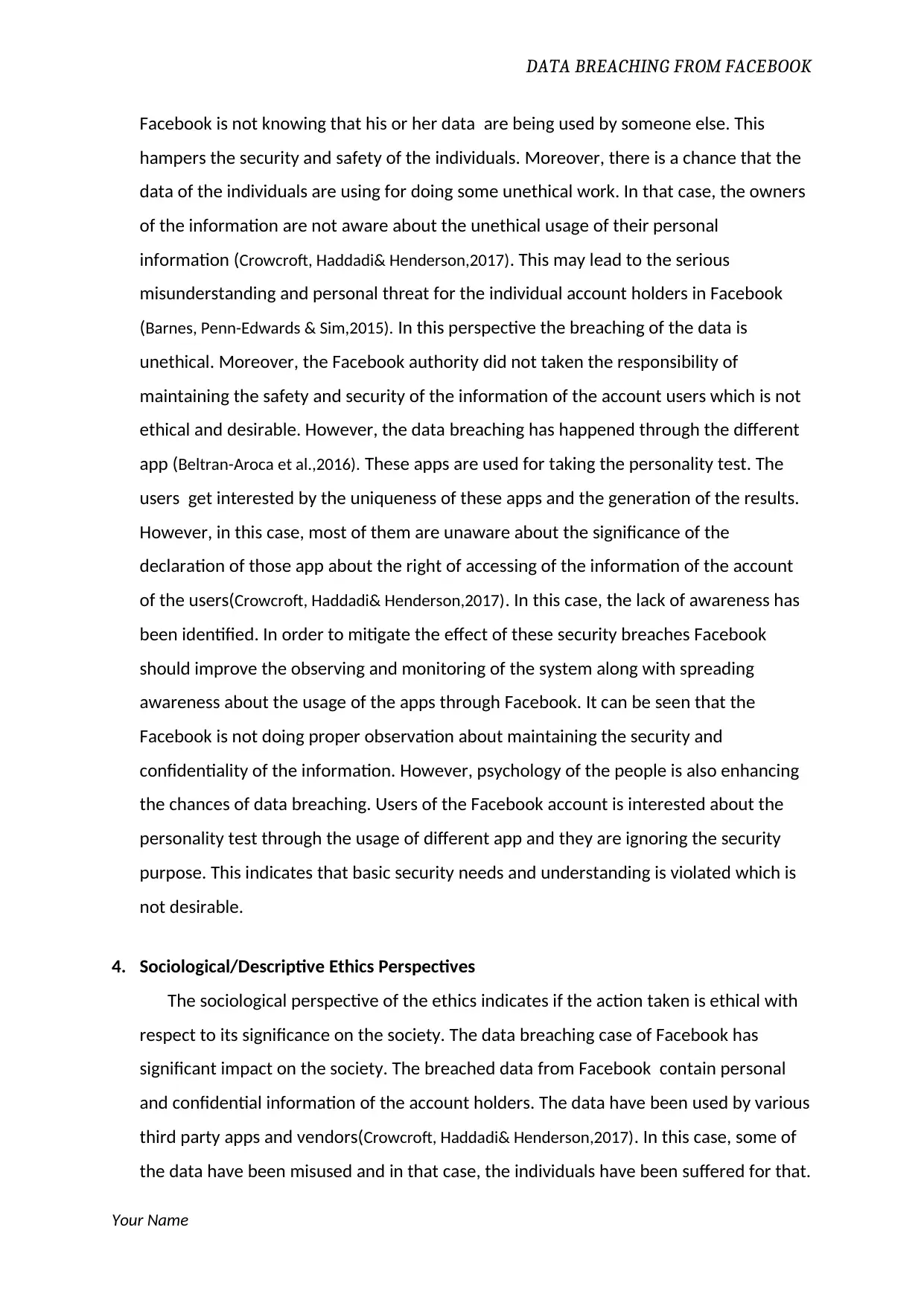
DATA BREACHING FROM FACEBOOK
Facebook is not knowing that his or her data are being used by someone else. This
hampers the security and safety of the individuals. Moreover, there is a chance that the
data of the individuals are using for doing some unethical work. In that case, the owners
of the information are not aware about the unethical usage of their personal
information (Crowcroft, Haddadi& Henderson,2017). This may lead to the serious
misunderstanding and personal threat for the individual account holders in Facebook
(Barnes, Penn-Edwards & Sim,2015). In this perspective the breaching of the data is
unethical. Moreover, the Facebook authority did not taken the responsibility of
maintaining the safety and security of the information of the account users which is not
ethical and desirable. However, the data breaching has happened through the different
app (Beltran-Aroca et al.,2016). These apps are used for taking the personality test. The
users get interested by the uniqueness of these apps and the generation of the results.
However, in this case, most of them are unaware about the significance of the
declaration of those app about the right of accessing of the information of the account
of the users(Crowcroft, Haddadi& Henderson,2017). In this case, the lack of awareness has
been identified. In order to mitigate the effect of these security breaches Facebook
should improve the observing and monitoring of the system along with spreading
awareness about the usage of the apps through Facebook. It can be seen that the
Facebook is not doing proper observation about maintaining the security and
confidentiality of the information. However, psychology of the people is also enhancing
the chances of data breaching. Users of the Facebook account is interested about the
personality test through the usage of different app and they are ignoring the security
purpose. This indicates that basic security needs and understanding is violated which is
not desirable.
4. Sociological/Descriptive Ethics Perspectives
The sociological perspective of the ethics indicates if the action taken is ethical with
respect to its significance on the society. The data breaching case of Facebook has
significant impact on the society. The breached data from Facebook contain personal
and confidential information of the account holders. The data have been used by various
third party apps and vendors(Crowcroft, Haddadi& Henderson,2017). In this case, some of
the data have been misused and in that case, the individuals have been suffered for that.
Your Name
Facebook is not knowing that his or her data are being used by someone else. This
hampers the security and safety of the individuals. Moreover, there is a chance that the
data of the individuals are using for doing some unethical work. In that case, the owners
of the information are not aware about the unethical usage of their personal
information (Crowcroft, Haddadi& Henderson,2017). This may lead to the serious
misunderstanding and personal threat for the individual account holders in Facebook
(Barnes, Penn-Edwards & Sim,2015). In this perspective the breaching of the data is
unethical. Moreover, the Facebook authority did not taken the responsibility of
maintaining the safety and security of the information of the account users which is not
ethical and desirable. However, the data breaching has happened through the different
app (Beltran-Aroca et al.,2016). These apps are used for taking the personality test. The
users get interested by the uniqueness of these apps and the generation of the results.
However, in this case, most of them are unaware about the significance of the
declaration of those app about the right of accessing of the information of the account
of the users(Crowcroft, Haddadi& Henderson,2017). In this case, the lack of awareness has
been identified. In order to mitigate the effect of these security breaches Facebook
should improve the observing and monitoring of the system along with spreading
awareness about the usage of the apps through Facebook. It can be seen that the
Facebook is not doing proper observation about maintaining the security and
confidentiality of the information. However, psychology of the people is also enhancing
the chances of data breaching. Users of the Facebook account is interested about the
personality test through the usage of different app and they are ignoring the security
purpose. This indicates that basic security needs and understanding is violated which is
not desirable.
4. Sociological/Descriptive Ethics Perspectives
The sociological perspective of the ethics indicates if the action taken is ethical with
respect to its significance on the society. The data breaching case of Facebook has
significant impact on the society. The breached data from Facebook contain personal
and confidential information of the account holders. The data have been used by various
third party apps and vendors(Crowcroft, Haddadi& Henderson,2017). In this case, some of
the data have been misused and in that case, the individuals have been suffered for that.
Your Name
Paraphrase This Document
Need a fresh take? Get an instant paraphrase of this document with our AI Paraphraser
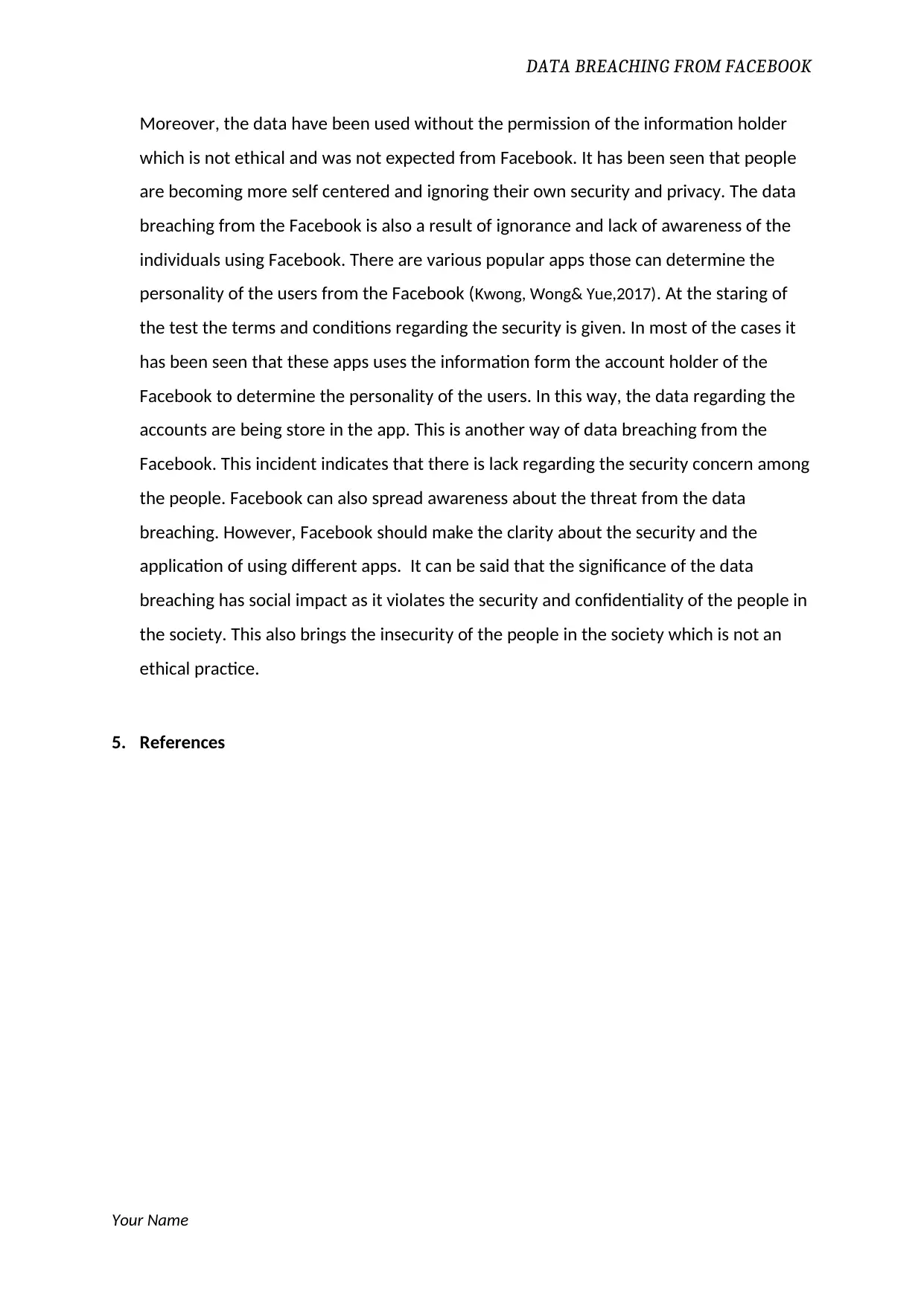
DATA BREACHING FROM FACEBOOK
Moreover, the data have been used without the permission of the information holder
which is not ethical and was not expected from Facebook. It has been seen that people
are becoming more self centered and ignoring their own security and privacy. The data
breaching from the Facebook is also a result of ignorance and lack of awareness of the
individuals using Facebook. There are various popular apps those can determine the
personality of the users from the Facebook (Kwong, Wong& Yue,2017). At the staring of
the test the terms and conditions regarding the security is given. In most of the cases it
has been seen that these apps uses the information form the account holder of the
Facebook to determine the personality of the users. In this way, the data regarding the
accounts are being store in the app. This is another way of data breaching from the
Facebook. This incident indicates that there is lack regarding the security concern among
the people. Facebook can also spread awareness about the threat from the data
breaching. However, Facebook should make the clarity about the security and the
application of using different apps. It can be said that the significance of the data
breaching has social impact as it violates the security and confidentiality of the people in
the society. This also brings the insecurity of the people in the society which is not an
ethical practice.
5. References
Your Name
Moreover, the data have been used without the permission of the information holder
which is not ethical and was not expected from Facebook. It has been seen that people
are becoming more self centered and ignoring their own security and privacy. The data
breaching from the Facebook is also a result of ignorance and lack of awareness of the
individuals using Facebook. There are various popular apps those can determine the
personality of the users from the Facebook (Kwong, Wong& Yue,2017). At the staring of
the test the terms and conditions regarding the security is given. In most of the cases it
has been seen that these apps uses the information form the account holder of the
Facebook to determine the personality of the users. In this way, the data regarding the
accounts are being store in the app. This is another way of data breaching from the
Facebook. This incident indicates that there is lack regarding the security concern among
the people. Facebook can also spread awareness about the threat from the data
breaching. However, Facebook should make the clarity about the security and the
application of using different apps. It can be said that the significance of the data
breaching has social impact as it violates the security and confidentiality of the people in
the society. This also brings the insecurity of the people in the society which is not an
ethical practice.
5. References
Your Name

DATA BREACHING FROM FACEBOOK
Barnes, N., Penn-Edwards, S., & Sim, C. (2015). A dialogic about using Facebook status updates for
education research: a PhD student's journey. Educational research and evaluation, 21(2),
109-121.
Beltran-Aroca, C. M., Girela-Lopez, E., Collazo-Chao, E., Montero-Pérez-Barquero, M., & Muñoz-
Villanueva, M. C. (2016). Confidentiality breaches in clinical practice: what happens in
hospitals?. BMC medical ethics, 17(1), 52.
Crowcroft, J., Haddadi, H., & Henderson, T. (2017). Responsible Research on Social Networks:
Dilemmas and Solutions.
Gupta, A. (2017). THE EVOLUTION OF FRAUD: ETHICAL IMPLICATIONS IN THE AGE OF LARGE-SCALE
DATA BREACHES AND WIDESPREAD ARTIFICIAL INTELLIGENCE SOLUTIONS DEPLOYMENT.
Halford, S. (2017). The Ethical Disruptions of Social Media Data: Tales from the Field. In The Ethics of
Online Research(pp. 13-25). Emerald Publishing Limited.
Kleinsman, J., & Buckley, S. (2015). Facebook study: a little bit unethical but worth it?. Journal of
Bioethical inquiry, 12(2), 179-182.
Kosinski, M., Matz, S. C., Gosling, S. D., Popov, V., & Stillwell, D. (2015). Facebook as a research tool
for the social sciences: Opportunities, challenges, ethical considerations, and practical
guidelines. American Psychologist, 70(6), 543.
Kwong, T., Wong, E., & Yue, K. (2017). Bringing Abstract Academic Integrity and Ethical Concepts into
Real-Life Situations. Technology, Knowledge and Learning, 22(3), 353-368.
Markham, A., & Buchanan, E. (2017). 14. Research Ethics in Context. The Datafied Society, 201
Murphy, E. J. (2017). An Ethical Dilemma: To Share or Not To Share Your Paper Published in Lipids
Using an On-Line Outlet.
Richards, N. M., & King, J. H. (2014). Big data ethics. Wake Forest L. Rev., 49, 393.
Wells, K. J., Gordon, J. R., Su, H. I., Plosker, S., & Quinn, G. P. (2015). Ethical considerations for
informed consent in infertility research: The use of electronic health records. Advances in
medical ethics, 2.
Do not remove the following marking sheet.
Marking Sheet
Criteria Standards
Marks
award
ed
Use professional,
philosophical, and
sociological/descri
HD: Comprehensive understanding of the professional,
philosophical, and sociological/descriptive ethics perspectives
through in-depth discussion and analysis of three most relevant
Your Name
Barnes, N., Penn-Edwards, S., & Sim, C. (2015). A dialogic about using Facebook status updates for
education research: a PhD student's journey. Educational research and evaluation, 21(2),
109-121.
Beltran-Aroca, C. M., Girela-Lopez, E., Collazo-Chao, E., Montero-Pérez-Barquero, M., & Muñoz-
Villanueva, M. C. (2016). Confidentiality breaches in clinical practice: what happens in
hospitals?. BMC medical ethics, 17(1), 52.
Crowcroft, J., Haddadi, H., & Henderson, T. (2017). Responsible Research on Social Networks:
Dilemmas and Solutions.
Gupta, A. (2017). THE EVOLUTION OF FRAUD: ETHICAL IMPLICATIONS IN THE AGE OF LARGE-SCALE
DATA BREACHES AND WIDESPREAD ARTIFICIAL INTELLIGENCE SOLUTIONS DEPLOYMENT.
Halford, S. (2017). The Ethical Disruptions of Social Media Data: Tales from the Field. In The Ethics of
Online Research(pp. 13-25). Emerald Publishing Limited.
Kleinsman, J., & Buckley, S. (2015). Facebook study: a little bit unethical but worth it?. Journal of
Bioethical inquiry, 12(2), 179-182.
Kosinski, M., Matz, S. C., Gosling, S. D., Popov, V., & Stillwell, D. (2015). Facebook as a research tool
for the social sciences: Opportunities, challenges, ethical considerations, and practical
guidelines. American Psychologist, 70(6), 543.
Kwong, T., Wong, E., & Yue, K. (2017). Bringing Abstract Academic Integrity and Ethical Concepts into
Real-Life Situations. Technology, Knowledge and Learning, 22(3), 353-368.
Markham, A., & Buchanan, E. (2017). 14. Research Ethics in Context. The Datafied Society, 201
Murphy, E. J. (2017). An Ethical Dilemma: To Share or Not To Share Your Paper Published in Lipids
Using an On-Line Outlet.
Richards, N. M., & King, J. H. (2014). Big data ethics. Wake Forest L. Rev., 49, 393.
Wells, K. J., Gordon, J. R., Su, H. I., Plosker, S., & Quinn, G. P. (2015). Ethical considerations for
informed consent in infertility research: The use of electronic health records. Advances in
medical ethics, 2.
Do not remove the following marking sheet.
Marking Sheet
Criteria Standards
Marks
award
ed
Use professional,
philosophical, and
sociological/descri
HD: Comprehensive understanding of the professional,
philosophical, and sociological/descriptive ethics perspectives
through in-depth discussion and analysis of three most relevant
Your Name
⊘ This is a preview!⊘
Do you want full access?
Subscribe today to unlock all pages.

Trusted by 1+ million students worldwide
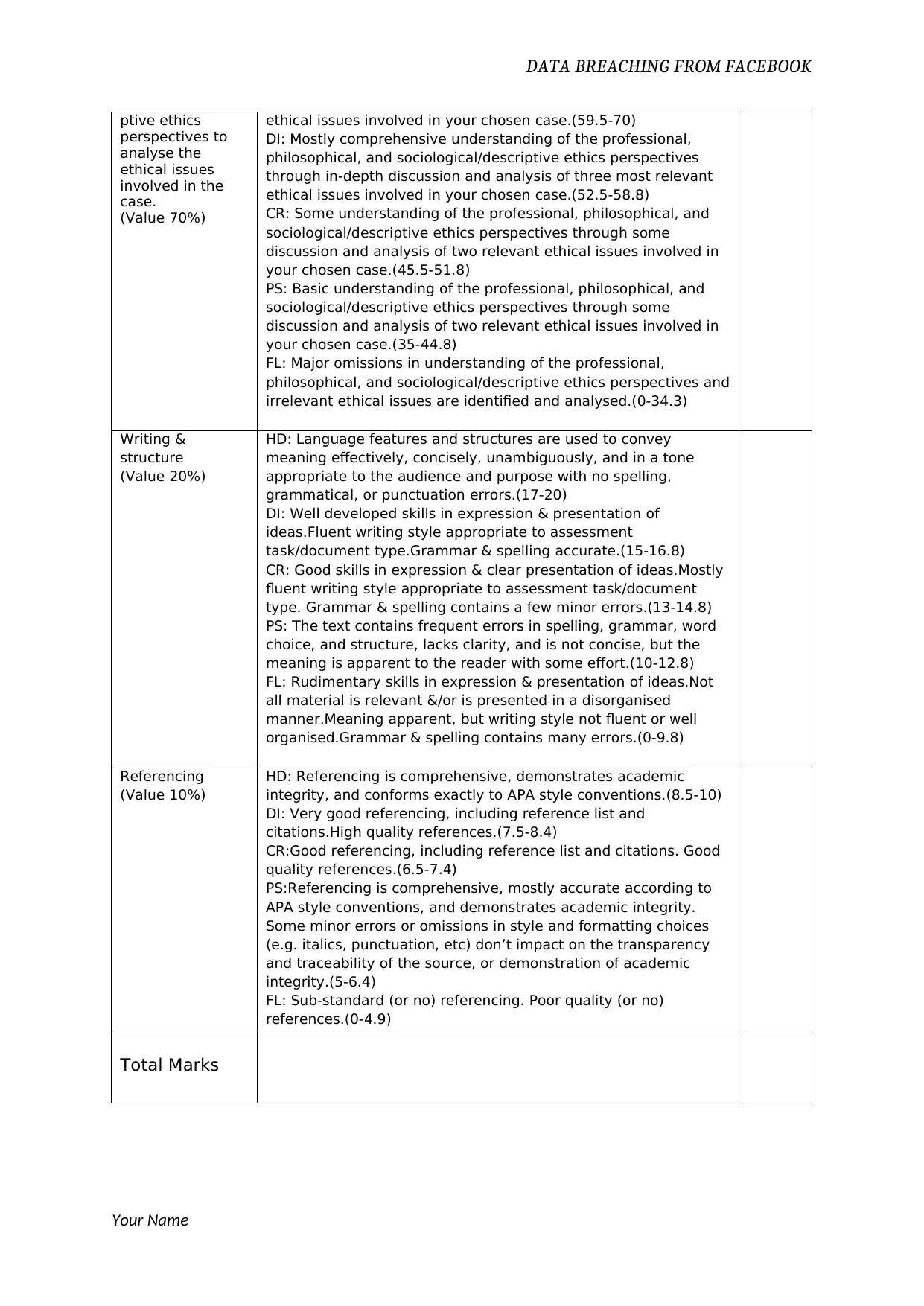
DATA BREACHING FROM FACEBOOK
ptive ethics
perspectives to
analyse the
ethical issues
involved in the
case.
(Value 70%)
ethical issues involved in your chosen case.(59.5-70)
DI: Mostly comprehensive understanding of the professional,
philosophical, and sociological/descriptive ethics perspectives
through in-depth discussion and analysis of three most relevant
ethical issues involved in your chosen case.(52.5-58.8)
CR: Some understanding of the professional, philosophical, and
sociological/descriptive ethics perspectives through some
discussion and analysis of two relevant ethical issues involved in
your chosen case.(45.5-51.8)
PS: Basic understanding of the professional, philosophical, and
sociological/descriptive ethics perspectives through some
discussion and analysis of two relevant ethical issues involved in
your chosen case.(35-44.8)
FL: Major omissions in understanding of the professional,
philosophical, and sociological/descriptive ethics perspectives and
irrelevant ethical issues are identified and analysed.(0-34.3)
Writing &
structure
(Value 20%)
HD: Language features and structures are used to convey
meaning effectively, concisely, unambiguously, and in a tone
appropriate to the audience and purpose with no spelling,
grammatical, or punctuation errors.(17-20)
DI: Well developed skills in expression & presentation of
ideas.Fluent writing style appropriate to assessment
task/document type.Grammar & spelling accurate.(15-16.8)
CR: Good skills in expression & clear presentation of ideas.Mostly
fluent writing style appropriate to assessment task/document
type. Grammar & spelling contains a few minor errors.(13-14.8)
PS: The text contains frequent errors in spelling, grammar, word
choice, and structure, lacks clarity, and is not concise, but the
meaning is apparent to the reader with some effort.(10-12.8)
FL: Rudimentary skills in expression & presentation of ideas.Not
all material is relevant &/or is presented in a disorganised
manner.Meaning apparent, but writing style not fluent or well
organised.Grammar & spelling contains many errors.(0-9.8)
Referencing
(Value 10%)
HD: Referencing is comprehensive, demonstrates academic
integrity, and conforms exactly to APA style conventions.(8.5-10)
DI: Very good referencing, including reference list and
citations.High quality references.(7.5-8.4)
CR:Good referencing, including reference list and citations. Good
quality references.(6.5-7.4)
PS:Referencing is comprehensive, mostly accurate according to
APA style conventions, and demonstrates academic integrity.
Some minor errors or omissions in style and formatting choices
(e.g. italics, punctuation, etc) don’t impact on the transparency
and traceability of the source, or demonstration of academic
integrity.(5-6.4)
FL: Sub-standard (or no) referencing. Poor quality (or no)
references.(0-4.9)
Total Marks
Your Name
ptive ethics
perspectives to
analyse the
ethical issues
involved in the
case.
(Value 70%)
ethical issues involved in your chosen case.(59.5-70)
DI: Mostly comprehensive understanding of the professional,
philosophical, and sociological/descriptive ethics perspectives
through in-depth discussion and analysis of three most relevant
ethical issues involved in your chosen case.(52.5-58.8)
CR: Some understanding of the professional, philosophical, and
sociological/descriptive ethics perspectives through some
discussion and analysis of two relevant ethical issues involved in
your chosen case.(45.5-51.8)
PS: Basic understanding of the professional, philosophical, and
sociological/descriptive ethics perspectives through some
discussion and analysis of two relevant ethical issues involved in
your chosen case.(35-44.8)
FL: Major omissions in understanding of the professional,
philosophical, and sociological/descriptive ethics perspectives and
irrelevant ethical issues are identified and analysed.(0-34.3)
Writing &
structure
(Value 20%)
HD: Language features and structures are used to convey
meaning effectively, concisely, unambiguously, and in a tone
appropriate to the audience and purpose with no spelling,
grammatical, or punctuation errors.(17-20)
DI: Well developed skills in expression & presentation of
ideas.Fluent writing style appropriate to assessment
task/document type.Grammar & spelling accurate.(15-16.8)
CR: Good skills in expression & clear presentation of ideas.Mostly
fluent writing style appropriate to assessment task/document
type. Grammar & spelling contains a few minor errors.(13-14.8)
PS: The text contains frequent errors in spelling, grammar, word
choice, and structure, lacks clarity, and is not concise, but the
meaning is apparent to the reader with some effort.(10-12.8)
FL: Rudimentary skills in expression & presentation of ideas.Not
all material is relevant &/or is presented in a disorganised
manner.Meaning apparent, but writing style not fluent or well
organised.Grammar & spelling contains many errors.(0-9.8)
Referencing
(Value 10%)
HD: Referencing is comprehensive, demonstrates academic
integrity, and conforms exactly to APA style conventions.(8.5-10)
DI: Very good referencing, including reference list and
citations.High quality references.(7.5-8.4)
CR:Good referencing, including reference list and citations. Good
quality references.(6.5-7.4)
PS:Referencing is comprehensive, mostly accurate according to
APA style conventions, and demonstrates academic integrity.
Some minor errors or omissions in style and formatting choices
(e.g. italics, punctuation, etc) don’t impact on the transparency
and traceability of the source, or demonstration of academic
integrity.(5-6.4)
FL: Sub-standard (or no) referencing. Poor quality (or no)
references.(0-4.9)
Total Marks
Your Name
1 out of 7
Related Documents
Your All-in-One AI-Powered Toolkit for Academic Success.
+13062052269
info@desklib.com
Available 24*7 on WhatsApp / Email
![[object Object]](/_next/static/media/star-bottom.7253800d.svg)
Unlock your academic potential
Copyright © 2020–2026 A2Z Services. All Rights Reserved. Developed and managed by ZUCOL.





